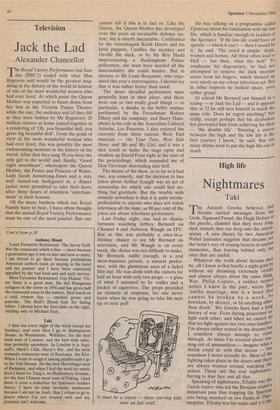Television
Jack the Lad
Alexander Chancellor
he Royal Variety Performance last Sun-
1 day (BBC1) ended with what Max Bygraves said would be the greatest sing- along in the history of the world in honour of one of the most wonderful women who had ever lived. At which point the Queen Mother was expected to beam down from her box in the Victoria Palace Theatre while the cast, the audience and (if they did as they were bidden by Mr Bygraves) 20 million viewers at home joined together in a rendering of 'Oh, you beautiful doll, you great big beautiful doll'. From the point of view of the most wonderful woman who had ever lived, this was possibly the most embarrassing moment in the history of the world. After that they sang 'If you were the only girl in the world' and, finally, 'Good night sweetheart'; whereupon the Queen Mother, the Prince and Princess of Wales, Lady Sarah Armstrong-Jones and a very well turned-out bodyguard in a dinner jacket were permitted to take their leave after three hours of relentless 'entertain- ment' in their honour.
Of the many burdens which our Royal Family have to bear, I have often thought that the annual Royal Variety Performance must be one of the most painful. But one
cannot tell if this is in fact so. Like the Queen, the Queen Mother has developed over the years an invaluable defence sys- tem; she is utterly inscrutable. Confronted by the ventriloquist Keith Harris and his lurid puppets, Cuddles the monkey and Orville the duck, or by Mr Roy Hudd impersonating a Buckingham Palace policeman, she must have needed all the inscrutability she could muster. But in fairness to Mr Louis Benjamin, who orga- nised this year's extravaganza, I should say that it was rather better than usual.
The more dreadful performers were generally kept in their place, and there were one or two really good things — in particular, a monks in the belfry routine performed by the Frenchman Robert Dhery and his company, and Barry Hum- phries in his role as the Australian Cultural Attache, Les Paterson. I also enjoyed the excerpts from three current West End musicals — On Your Toes, West Side Story, and Me and My Girl; and it was a nice touch to make the stage open and swallow up David Frost right at the start of the proceedings, which reminded me of Don Giovanni descending into hell.
The theme of the show, in so far as it had one, was comedy, and the decision to ban jokes about Arthur Scargill was an act of censorship for which one could feel no- thing but gratitude. But the trouble with comedy nowadays is that it is quite incom- prehensible to anyone who does not watch television all the time, as 90 per cent of the jokes are about television performers.
Last Friday night, one had to choose between watching Jeffrey Bernard on Channel 4 and Auberon Waugh on ITV. But as this was probably a once-in-a- lifetime chance to see Mr Bernard on television, and Mr Waugh is on every week, the choice was not difficult to make. Mr Bernard, oddly enough, is a real show-business person, a natural perfor- mer, with the glamorous aura of a faded film star. He was alone with the camera for half an hour with only two props — a glass of what I assumed to be vodka and a packet of cigarettes. The props provided an element of suspense, for one never knew when he was going to take his next sip or next puff.
It must be a repeat — these starving kids were on last week.'
He was talking on a programme called Opinions about his fascination with the low life, which is familiar enough to readers of the Spectator. 'If the low life could have an apostle — which it can't — then I would be it,' he said. 'The creed is simple: drink, women and horses. All three often lead to Hell — but then, what the hell!' To emphasise his degeneracy, he had not attempted to remove the dark nicotine stains from his fingers, which showed up very nicely on my colour television set. But in other respects he looked smart, even rather grand.
At school Mr Bernard saw himself as a scamp — or Jack the Lad — and it appears that at 52 he still sees himself in much the same role. Does he regret anything? Not really, except perhaps that his alcoholism has prevented him from achieving his ideal — 'the double life'. 'Steering a course between the high and the low life is the best journey I know,' he said. But too many drinks tend to put the high life out of reach.






















































 Previous page
Previous page